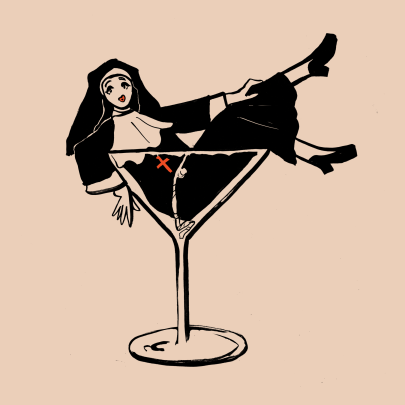Mar 19, 2016 Theatre

When I went to Athens a few years ago, the t-shirt I kept seeing being flogged to the tourists read: “Oedipus, the ORIGINAL Mother F***er”.
Having been a Freudian punch-line for so long now, it can be easy to forget the power that this story holds when it is done well. Sophocles, Euripides and Aeschylus were all drawn to the myth of the man who, in attempting to escape the Delphic prophecy that he would kill his father and marry his mother, walked straight into that very situation.
Oedipus is asked three questions at the beginning of this production: Who are you? Where have you come from? Where are you going? He thinks he knows the answers, but he knows nothing. He’ll soon learn. Korean Theatre Company Juk-Dal’s adaptation reinvests the foundational Greek Tragedy with the full horror of the play, as the darkness of denial is hauled into the burning light of self-knowledge.
Most of the action plays out on a large circular stage, which is echoed by a disc hovering precariously above. Oedipus is trapped between the Gods and the earth, fatalism and free choice. A key line, displayed via surtitle, that sums up this version’s philosophy, is that “decisions and choices are the inevitable fate of human kind”. A performer lies on the circle with one foot bound by rope. He picks up the knot on the other end, and binds the other foot. We do this to ourselves.
The Chorus is a Physical-Opera, where Uzong Choe’s ritualistic music and choreographer Eun-Jung Jang’s transfixing movement bring us all into a heightened space of emotional dread. The tension is pulled like an elastic band as we wait for the inevitable snap.
The chorus move with discipline and precision. Plague ridden, they drag chairs onto the stage, and supplicate themselves in front of Oedipus to save the city. Even here, we see the strength in unity that the chorus possess; Oedipus, solo, is vulnerable. Throughout the chorus are restless, never seated in one place for long. When Oedipus meets the blind prophet Tiresias, they become menacing birds of prey. Dressed in white, they are a swirling hurricane of cloth.
Though The Chorus is the title, and Oedipus is the sub-title, it is still Oedipus’s story and is largely told in alignment with his point of view. Yoon Ho Nam’s Oedipus is a haunted man even from beginning, and as he pursues the investigation into the death of the previous King, and goes deeper into the quagmire, he takes the body blows of recall and revelation.
There is early suspicion cast on Oedipus’s wife Jocasta (Kang Hee Yim), the never aging woman, and what she knows. Her heart cries are terrible when she can no longer deny.
Though director Jae-Hung Seo’s production is a thrilling stylistic reinvention, playwright Areum Han storytelling is traditionally classical. Excepting the staging of flashbacks and recurring image motifs, the structure is taken straight from Sophocles’ playbook. Without being able to read the commentary on Korean culture, it becomes a fairly straight retelling of the story, and I have no doubt some resonance is lost in this Auckland Arts Festival tour.
The dramatic position is one of dramatic irony, where the audience wait for Oedipus to play catch-up to what we already know. So the question for any production of Oedipus, is what does it do with our knowledge in the interim? Sometimes the oncoming train was too slow moving. Sometimes the production was too beholden the text, without offering new shades of meaning that could reverberate in a modern context. Sometimes they were too beholden to Oedipus as protagonist, at the expense of the promise of chorus as agent.
The people have stakes in this too: if Oedipus doesn’t relieve the plague on Thebes, they are doomed, so it is also about their struggle for survival, but after the early scenes, this sense of Greek public largely disappears. The chorus are used as reflections of Oedipus, rather than observers.
It’s an incredibly exciting, heart-pounding way to do a Greek Tragedy though. If you have a working knowledge of the story, it’s best to wean yourself away from the surtitles, to better appreciate the passion and craft of the cast and the timbre of the language.
There’s still that question of what this myth means for us now, which this production doesn’t really answer. During the bows the chorus continue to sing, the translation telling us that “each of you will encounter your own three-way junction”, but this seems a fairly trite distillation of the story’s message. I like instead their idea that a name is the first curse parents give to their offspring. Researchers like Oliver James (Not In Your Genes: The real reasons children are like their parents) suggest that our inherited genes are not very influential in determining our psychological behaviour, but instead almost entirely in how we were nurtured. It is perhaps here that Oedipus finds his exile today. To what extent are we able to be our own person, and how much of our destiny has been handed to us and fixed by our parents?
The Chorus;Oedipus, Q Theatre, until 20 March





